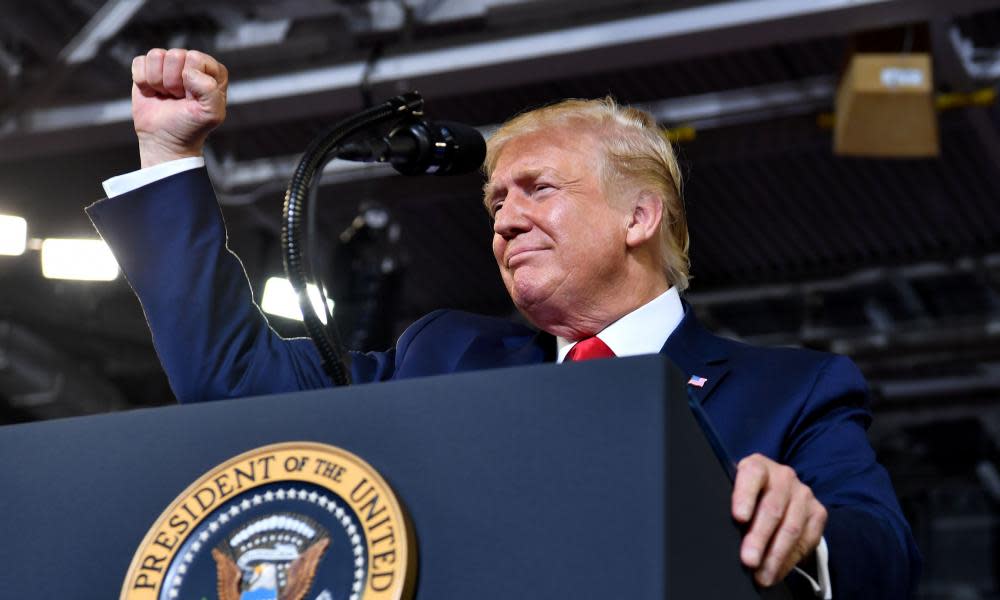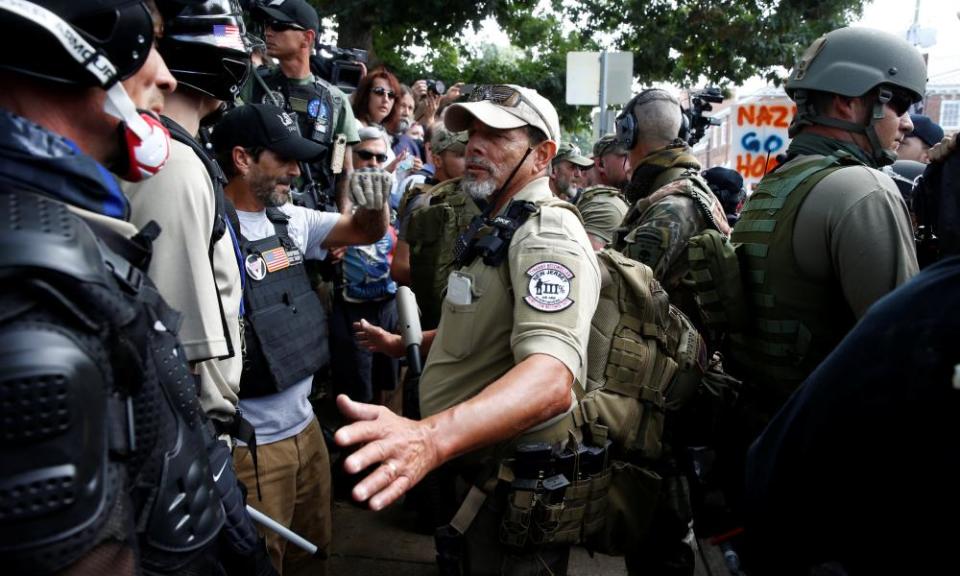'It's a political civil war': Trump's racist tirades set tone for 2020

If Donald Trump’s racist diatribe against four congresswomen of colour was intended to animate his most loyal supporters, it seemed to have worked with Clark Smith.
Related: The moderate squad: swing-state Democrats wary of leftward path
“Mr Trump didn’t say anything all,” the 58-year-old said. “He’s an extremely un-racist person and I sincerely mean that. He’s not stoking any racial resentment. The Democrats are. They are all about identity politics. Mr Trump doesn’t care about race, he doesn’t care about religion. He cares about America.”
Smith lives just outside Charlottesville, Virginia, a city that knows the consequences of the president’s race-baiting better than any other. It was here, nearly two years ago, that a march by white supremacists and Ku Klux Klan members brandishing shields, clubs and guns, ostensibly to defend a statue of Confederate general Robert E Lee, led to violent clashes and the death of counter-protester Heather Heyer.
Trump’s claim that there had been “very fine people on both sides” was a comment that will live in infamy. This week he did it again, tweeting that progressive congresswomen Alexandria Ocasio-Cortez, Ilhan Omar, Ayanna Pressley and Rashida Tlaib should “go back” to their countries. Then, at a rally on Wednesday night, Trump again tore into Omar, a US citizen born in Somalia, and remained silent for 13 chilling seconds as the crowd chanted: “Send her back! Send her back!”
It was a clarifying moment about the two faces of America in 2019. One is that of a 73-year-old white man spewing nativist bigotry and raging against change. The other is that of a 37-year-old hijab-wearing Muslim woman, a refugee from Africa turned congresswoman greeted with cries of “Welcome home, Ilhan!” on her return to Minnesota.
To many this feels like a pivot point in history. In the New Yorker, Susan Glasser wrote of Trump: “Half of the country is appalled but not really sure how to combat him; the other half is cheering, or at least averting its gaze. This is what a political civil war looks like, with words, for now, as weapons.”
Smith, a financial consultant, knows which side he is on.
He's making those four the face of the Democratic party and the party is not distancing itself from them
Clark Smith
“Trump’s for all America and these four women hate America,” he said. “They want to change America into something I don’t recognise. If they were a bunch of white choirboys, I would be saying the same thing. They say we have a racist country , but I think there is very little broken in America right now.”
Intentionally or not, Trump’s embrace of white identity politics may work to his advantage next year. Only four House Republicans voted for a resolution to condemn his remarks. A Reuters/Ipsos poll showed his net approval among Republicans rose by five points to 72%.
“It’s a brilliant strategy,” said Smith, who intends to vote for Trump again. “He is making those four the face of the Democratic party and the party is not distancing itself from them. Unless the Democrats become more realistic about what America wants and needs, he’s going to point it out over and over again.”
‘He doesn’t do anything without a purpose’
Trump founded his political career on a conspiracy theory about Barack Obama’s birthplace and saw his poll figures rise when he demanded a ban on Muslims entering the US. He won white voters by more than 20 points and appears to be aiming higher.
His rallies become electrified not when he cites achievements or ambitions but when he unleashes bilious tirades against Obama, Clinton, political correctness and the media. The “squad” of four leftwing congresswomen of colourhas become his ideal foil. The quartet are more strongly disliked by Republicans than the Democrats’ 2020 candidates, according to an Economist-YouGov poll.
Tyler Sewell, 53, sitting outside the Mudhouse Downtown cafe in Charlottesville, said Trump’s racism was calculated.
“He doesn’t do anything without a purpose,” he said. “He’s targeting that base and we know what he’s saying. He wouldn’t have said ‘Go back where you came from’ if he didn’t really intend to say immigrants go home.
“He’s playing on this fear – there’s a real white, blue-collar American fear of the browning of America. They’re afraid of brown people. It’s irrational. It’s unavoidable. Our country is getting browner and that’s just the way it’s going to be. They see the browning of America as a loss of American values but it’s American values we were all brought up with as white people.”
Sewell, who works in digital media, voted for Trump in 2016 but now bitterly regrets it and will not do so again.
A lot of my Democrat friends are terrified. They think Trump’s gonna win. I don’t. I think he’s going to lose
Tyler Sewell
“He thinks he’s going to win,” he said. “I don’t imagine how he’s ever going to win this time because I look at Republican women and I don’t know a woman alive that’s gonna vote for this man now.
“A lot of my Democrat friends are terrified. They see the writing on the wall and think Trump’s gonna win. I don’t. I think he’s going to lose. But I am ashamed. I would like to take that vote back.”
‘I remember segregation’
Trump supporters are scarce in Charlottesville, a college town where Hillary Clinton won nearly 80% of the vote and where the mayor is an African American woman. The white supremacists who stormed it came from elsewhere. The city regained its footing.
As the sound of cicadas filled a hot summer night, Olivia Branch, who works in the hospitality industry, said: “People realised it was not who we truly are and did not reflect our community. Charlottesville is a wonderful place. It is very diverse and has a lot to offer.”
Sitting in a square still dominated by the Lee statue, Branch, 63, acknowledged that white supremacists have been emboldened “ They’ve always been around. They just now feel that they have a platform and a supporter. They’re coming out of the dark and into the light. We’re more aware.

“I grew up in this community. I’m a woman of colour so I remember segregation but I also remember classmates whose parents were probably Klansmen, but my classmates didn’t tell me that. And now people are boldly letting you know that they are that, so it’s sad but it’s always been there.”
Although Charlottesville was named the happiest place in America in 2014, some see it as a manifestation of white privilege and complacency. African Americans still suffer inferior access to education, healthcare and housing as well as a climate of casual racism and condescension. The black population has declined.
Andrea Douglas, executive director of the Jefferson School African American Heritage Center, said: “I still go into stores and have people lurk behind me wondering what I’m going to do, as well-dressed as I am, and I still have people say how remarkably well-spoken I am which, after a whole lot of money spent on a PhD, years of teaching, years of curating exhibitions and standing in public doing this kind of work, is a ridiculous thing to say.
“But that has everything to do with the perceptions of this body when I walk in the room.”
I don’t think he’s after his base. I think he’s after the moderate who’s not yet comfortable with this conversation
Andrea Douglas
Conventional wisdom holds that Trump’s “premeditated racism” is designed to energise his base, often white people without college degrees in the industrial midwest. Douglas sees it differently.
“I don’t think he’s after his base. I think he’s after the moderate who’s not yet comfortable with this conversation
“He is positioning these four women as a socialist movement and he did it with Obama as well. So he is creating this not for his base. His base has decided. This is the centrist that he’s after.”
‘A long overdue reckoning’
Nonetheless, just as the election of Trump has led to a renaissance of progressive activism and investigative journalism, so what happened in Charlottesville has prompted initiatives to re-examine city history. A marker now commemorates the 1898 lynching of John Henry James. Construction is under way on a memorial to enslaved workers at the University of Virginia; the surrounding fence displays photos of African Americans from the turn of the 20th century.
John Edwin Mason, an academic and author co-directing the project, said: “The events of that white supremacist terror attack I would call a long overdue reckoning with Charlottesville’s past.
“We saw this as an opportunity, maybe we were forced to open our eyes, to see the city’s history more realistically, understand that we had been attacked. And looking at the roots of those problems is something that a lot of people are doing in all kinds of ways.”
Related: Trump wants to run against the Squad. Democrats must stay united | Lloyd Green
Next month will mark the second anniversary of the march in Charlottesville. There are fears racial tensions could explode again.
Mason said: “Charlottesville is always on edge when August comes around because people could come back wanting to cause problems. Could this kind of rhetoric encourage people to come back on 12 August and create havoc? This is the United States of America and the potential for violence is always present.”
The Rev Seth Wispelwey, who was among the organisers of local clergy opposition that day in 2017, shares the concerns.
“What the president is doing is putting zero light between himself and the white supremacist terrorists who see him not only as an ally but a champion,” he said.
“This is not an aberration. There is a through line to the founding of the United States.
“This is a volatile moment and there are no guarantees he will cede power. His fascist tendencies are on full display. His supporters have their man and he speaks to them in a language, sometimes coded, sometimes explicit, that they understand.”

